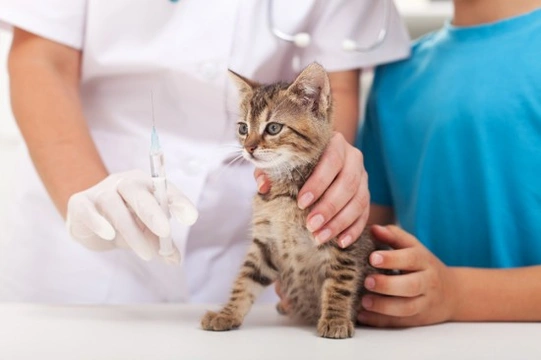
All about feline parvovirus
Parvovirus is a condition that is usually associated with dogs, particularly young, unvaccinated puppies, in which it is fast developing and highly unpleasant, painful and often fatal. However, parvovirus can also affect cats, and as with the canine version, is most likely to afflict young kittens before their immune systems have fully developed, and again, is often incurable. Feline parvovirus (FPV) is sometimes also known as feline panleucopenia or feline infectious enteritis (FIE).
What is feline parvovirus or FPV?
FPV is a viral condition that is extremely contagious and very resilient, and can survive outside of a host’s body for up to a year in the environment. FPV spreads quickly between cats, and is sadly often fatal. Multi-cat households and unvaccinated cats and kittens are most at risk. FPV cannot be transmitted to people or dogs, but the canine strain of parvovirus occasionally affects cats.
How is feline parvovirus transmitted?
Feline parvovirus can be passed from cat to cat via direct contact, however it is most commonly picked up from the environment, and contact with objects, clothing or people who have come into contact with the virus. Infected faeces are the most common cause of transmission, as they can infect the ground and the environment for some time. Even a cat that has been cured of parvovirus will still deposit the virus in their faeces for up to six weeks after recovery.A special disinfectant is required to kill parvovirus on clothes and surfaces; normal bleach or household disinfectants are not sufficient. If you work with other cats or dogs or are in contact with a variety of animals other than your own cats on a regular basis, you may wish to consider washing the clothes that you wear around them with special parvovirus disinfectant tablets, and not wearing the shoes you use for work inside the house.
What types of cats can catch FPV?
Young kittens who have not been vaccinated are particularly vulnerable to the condition, as their immune systems are not fully developed when they are young. Unvaccinated cats are also particularly at risk; ensure that your cats are vaccinated, and receive their annual boosters as required to help to minimise the chances of contracting feline parvovirus.
Symptoms of feline parvovirus
FPV is an acute illness that develops quickly, and you should not waste time in seeking veterinary treatment for your cat if you suspect they may have contracted feline parvovirus. FPV is sometimes asymptomatic, but the most common symptoms of FPV are listed below.
- A high temperature during the initial stages of the condition, later progressing to a lower than normal body temperature.
- Very loose stools or acute diarrhoea that may contain blood in some cases.
- Vomiting several times, even when the stomach is empty.
- Depression and listlessness, and generally appearing unhappy and in pain.
- Regurgitating soon after trying to eat and drink, or an inability to eat and drink. If your cat is showing an interest in food but fails to eat, particularly if they sit staring at their bowls, this is a warning sign.
Occasionally, feline parvovirus can make a cat very ill without displaying any outward symptoms, and can sometimes prove fatal with little or no warning.
Diagnosing feline parvovirus
Feline parvovirus is a veterinary emergency, so you should take your cat to the vet as a matter of urgency if you suspect they may have contracted the condition. Faecal samples and blood testing are used to diagnose feline parvovirus in live cats, and if a cat dies suddenly with no warning, samples from the intestine may be tested to identify if feline parvovirus was the cause of death. People who work with cats, such as in catteries and cat rehoming shelters may also have some of their cats tested for the presence of a particularly high level of antibodies against feline parvovirus in their systems, which can indicate that the surrounding environment is affected with the condition and may prove infectious to other cats.
Can feline parvovirus be cured?
There is no antivirus or medicinal cure for feline parvovirus; the survival of affected cats will depend greatly on the health and condition of the cat itself, how quickly the condition is diagnosed, and how the infection is managed as it progresses. Cats will normally be taken in as inpatients at their veterinary practice and intensively nursed with IV fluids and supplementary feeding.
After diagnosis
If your cat is diagnosed with FPV, as well as the treatment of the cat themselves, your vet will also give you a series of instructions on removing the viral contamination from your home and environment. This will involve a range of measures, including using a special parvovirus disinfectant to treat hard surfaces, litter trays and shoes, as well as possibly a wash additive to treat clothes and soft furnishings. Despite intensive cleaning and best intentions, feline parvovirus can remain within the ground and the environment for up to a year, and so it is important that you do not bring any unvaccinated cats or kittens into the home for at least a year after diagnosis. If you have neighbours with cats, it is also wise to inform them of the condition and advise them to get their own cats tested if they are unvaccinated.



